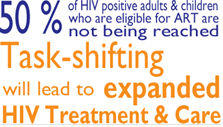Task-Sharing for Better HIV Care and Treatment in Côte d’Ivoire
Categories: Announcements, HIV/AIDS
In Côte d’Ivoire, many of the country’s frontline, rural health facilities do not have a doctor present to care for patients, particularly those with HIV and AIDS. Instead, paramedical staff ‒ nurses, midwives and nursing auxiliaries‒account for 50 percent of the country’s total health care workforce.
 Despite playing a key role in providing overall primary health services, nurses and midwives have had a limited official role in the area of care and treatment of people living with HIV. Fifty percent of HIV positive adults and children who are eligible for antiretroviral therapy (ART) are not being reached. In Cote d’Ivoire, the overall HIV prevalence rate is estimated to be 3.7 percent, but is it higher among women and girls. Access to care and treatment services, especially those preventing mother to child transmission, is particularly poor in rural areas.
Despite playing a key role in providing overall primary health services, nurses and midwives have had a limited official role in the area of care and treatment of people living with HIV. Fifty percent of HIV positive adults and children who are eligible for antiretroviral therapy (ART) are not being reached. In Cote d’Ivoire, the overall HIV prevalence rate is estimated to be 3.7 percent, but is it higher among women and girls. Access to care and treatment services, especially those preventing mother to child transmission, is particularly poor in rural areas.
Task-Sharing to Expand Access
To expand access to health care, the Ivoirian government has identified task-sharing between nurses/midwives and doctors for HIV care as a key strategy to improve HIV outcomes and to provide better care for HIV-positive clients. This task-sharing approach has been successfully implemented in many countries in the South and East of Africa, but Cote d’Ivoire is the first country in West Africa to adopt this policy. The Ministry of Health has put forth regulations and plans for a national scale-up of HIV task-sharing after a successful pilot program conducted last year in 27 facilities funded by the President’s Emergency Fund for AIDS Relief (PEPFAR).
Before the government adopted this task-shifting policy, only doctors were allowed to manage the care and treatment of people living with HIV. Paramedical staff, including nurses, were only involved in voluntary counseling and testing for HIV. If a patient tested positive for HIV at a health facility without an attending physician, then he or she was referred to another facility with a doctor trained in treating HIV. However, this referral system left many people living with HIV at risk of not entering the care system at all. Even for those initiating ART treatment, the loss-to-follow-up rate was estimated at 40 percent.
Bringing the Approach to a National Scale
Given these challenges, the government of Cote d’Ivoire urgently sought new approaches to expanding access to HIV care and treatment. To bring this task-shifting approach to a national scale, the Ministry of Health, with the support of the USAID Health Finance and Governance (HFG) project, will develop training modules on the principles of Option B+ task-sharing to integrate into pre-service health worker training curricula. Option B+ is a care and treatment approach recommended by the World Health Organization that provides lifelong ART to HIV-positive pregnant women to prevent mother-to-child transmission. This work will also include facilitating training for teachers and students on the modules, coordinating implementation with other partners involved in HIV service delivery, and monitoring and evaluating the program.
Soon, more than 350 students from nursing schools in Aboisso and Daloa, which are part of the national nursing school, will begin to apply these skills during their clinical practice rotations. The HFG project will track how many individuals living with HIV have initiated treatment as a result of this new approach to care and treatment.



